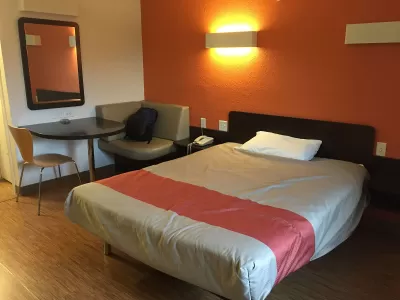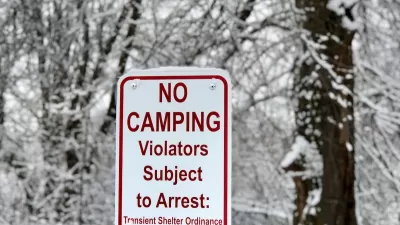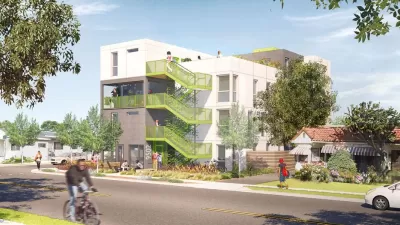The program funds the purchase of hotels for housing people experiencing homelessness as housing costs in the state continue to rise.

Modeled on California's project of the same name, Oregon's Project Roomkey uses state funds to purchase hotels which are then administered–and funded–by local organizations as housing for people experiencing homelessness. The $65 million initiative, writes Hannah Merzbah in High Country News, is also providing housing for people left unhoused by the fires that ravaged Oregon in September 2020.
Medford's Redwood Inn is one such hotel. "Rogue Retreat, a nonprofit, and the city of Medford received $2.55 million to buy the 47-unit Redwood Inn, which is prioritizing wildfire survivors. Later, the motel will house members of the general homeless population, who will pay a small rent. But for now, local and state grants, along with Federal Emergency Management Agency (FEMA) reimbursements, are paying the Redwood Inn’s estimated $91,000 monthly operational cost."
Even before the pandemic, close to a third of Jackson County residents spent more than half their income on housing. "And that was before the September 2020 wildfires exacerbated the county’s already acute affordable housing shortage. Of the nearly 2,500 homes destroyed in Jackson County, 60% were mobile homes." During the pandemic, "rents and home values skyrocketed amid high demand driven by the fires and an influx of out-of-state arrivals during the pandemic." Now, more residents than ever face eviction and homelessness, and those who lost homes in the fires struggle to find affordable housing. For families like the Martins, who lost their home in the fires, Project Roomkey offers a lifeline. "Living in the Redwood Inn rent-free means they can save up for a down payment on a house."
FULL STORY: Hotels for those left unhoused by wildfires

Study: Maui’s Plan to Convert Vacation Rentals to Long-Term Housing Could Cause Nearly $1 Billion Economic Loss
The plan would reduce visitor accommodation by 25% resulting in 1,900 jobs lost.

Alabama: Trump Terminates Settlements for Black Communities Harmed By Raw Sewage
Trump deemed the landmark civil rights agreement “illegal DEI and environmental justice policy.”

Why Should We Subsidize Public Transportation?
Many public transit agencies face financial stress due to rising costs, declining fare revenue, and declining subsidies. Transit advocates must provide a strong business case for increasing public transit funding.

Paris Bike Boom Leads to Steep Drop in Air Pollution
The French city’s air quality has improved dramatically in the past 20 years, coinciding with a growth in cycling.

Why Housing Costs More to Build in California Than in Texas
Hard costs like labor and materials combined with ‘soft’ costs such as permitting make building in the San Francisco Bay Area almost three times as costly as in Texas cities.

San Diego County Sees a Rise in Urban Coyotes
San Diego County experiences a rise in urban coyotes, as sightings become prevalent throughout its urban neighbourhoods and surrounding areas.
Urban Design for Planners 1: Software Tools
This six-course series explores essential urban design concepts using open source software and equips planners with the tools they need to participate fully in the urban design process.
Planning for Universal Design
Learn the tools for implementing Universal Design in planning regulations.
Smith Gee Studio
Alamo Area Metropolitan Planning Organization
City of Santa Clarita
Institute for Housing and Urban Development Studies (IHS)
City of Grandview
Harvard GSD Executive Education
Toledo-Lucas County Plan Commissions
Salt Lake City
NYU Wagner Graduate School of Public Service





























